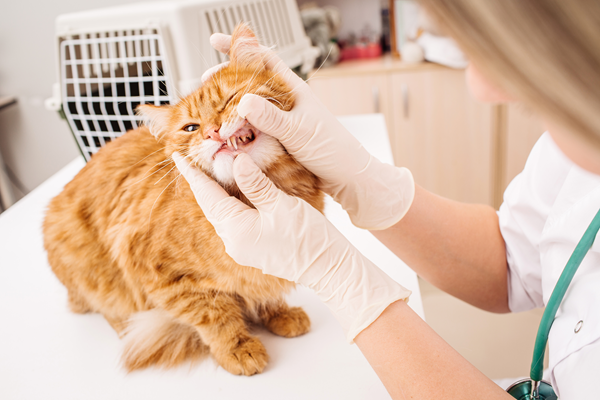
Did you know that up to 80% of dogs suffer from periodontal disease (PD)? It’s not just bad breath—this common condition can cause serious health problems beyond the mouth, potentially affecting your pet’s heart, liver, and kidneys. If left untreated, periodontal disease may even shorten their lifespan.
Let’s break down why managing your pet’s oral health is essential and how treatment can improve their quality of life.
What Is Periodontal Disease?
Periodontal disease starts with the buildup of dental plaque, a bacterial biofilm that coats the teeth. If not removed, it hardens into tartar, leading to:
- Gingivitis (gum inflammation)
- Periodontitis (infection of the tissues around the teeth)
- Bone and tooth loss
As periodontal disease progresses, it not only causes pain and tooth loss, but also allows bacteria to enter the bloodstream, potentially harming vital organs.
How Periodontal Disease Affects Your Pet’s Whole Body
Scientific research shows that the bacteria and inflammation from periodontal disease don’t just stay in the mouth. They can travel through the bloodstream and impact major organs, increasing the risk of several conditions:
- Heart Disease: Studies have linked periodontal disease with bacterial endocarditis, an infection of the heart’s inner lining, which can lead to heart failure.
- Kidney Disease: Bacteria from the mouth can reach the kidneys, leading to infections and reduced kidney function.
- Liver Disease: The liver helps filter toxins from the blood, but when it’s overwhelmed by bacteria from the mouth, it can suffer inflammation and damage.
- Increased Risk of Stroke and Blood Clots: Chronic inflammation from oral disease is linked to vascular problems, including an increased risk of blood clots and strokes.
A study found that dogs with periodontal disease were significantly more likely to have heart disease, reinforcing the importance of early detection and treatment.
How Treatment and Prevention Can Improve Your Pet’s Quality of Life
The good news? Periodontal disease is preventable and treatable! Here’s what you can do:
- Schedule Regular Vet Check-Ups: Your vet can detect early signs of dental disease before they become severe.
- Book Professional Dental Cleanings: Veterinarians can perform deep cleanings under anaesthesia, removing plaque and bacteria below the gumline.
- Brush Your Pet’s Teeth: Daily brushing, before gingivitis occurs, removes plaque before it turns into tartar. Use pet-safe toothpaste!
- Provide Dental Chews and Special Diets: Some foods and chews are designed to reduce plaque buildup. Check for the Veterinary Oral Health Council (VOHC) seal to know if the claims are accurate.
The Bottom Line: Healthier Teeth Mean a Longer Life
Taking care of your pet’s oral health does more than just prevent bad breath—it protects their heart, kidneys, liver, and overall health. By treating and preventing periodontal disease, you’re not just improving your pet’s quality of life—you may be adding years to it.
So, the next time you notice your pet’s breath smells bad, don’t ignore it—it could be a sign of something much bigger.
Don’t wait for bad breath—schedule a vet visit today and start a dental care routine for your pet!
